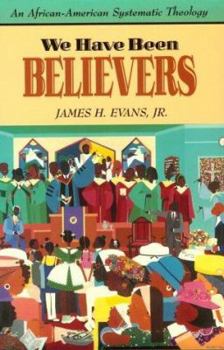We Have Been Believers
Select Format
Select Condition 
Book Overview
Seeking to overcome the chasm between church practice and theological reflection, James H. Evans Jr., a major and distinctive voice in American religion, situates theology squarely in the nexus of... This description may be from another edition of this product.
Format:Paperback
Language:English
ISBN:0800626729
ISBN13:9780800626723
Release Date:January 1993
Publisher:Augsburg Fortress Publishing
Length:178 Pages
Weight:0.71 lbs.
Dimensions:0.5" x 6.0" x 9.0"
Customer Reviews
3 ratings
Great Service
Published by Thriftbooks.com User , 15 years ago
Thanks for the prompt service. Book in excellent condition and received ahead of time.
A great analysis of a distinct theological tradition
Published by Thriftbooks.com User , 22 years ago
In his book, We Have Been Believers, James Evans seeks to examine the subject of Systematic theology from a uniquely African-American perspective. Part of the difficulty in doing this is that by its very nature this tradition does not have the history of formal theological development, rather the theology has arisen from practice and context rather than specific academic treatises. While it can be said that for the most part African-American congregations do not necessarily differ in a great deal of what can be called intellectual theology, and generally are aligned with denominations that themselves have a history of formal theological development, the great, the great difference in historical situation has radically impacted much of the actual interpretation and "working out" of this theology. As a people who have been traditionally oppressed within this nation, an African-American perspective can offer a great deal of insight about the nature of the church, and is truly a valuable study in its own right.The difficulty with attempting to do a specifically African-American ecclesiology, states Evans, is that there cannot be located a specific "African-American" church which could define the theology, rather these churches have a variety of theological traditions, customs and styles. Another difficulty is that the idea of community itself is such an inherent trait to African-American thought that typical doctrinal assertions simply are not adequate to describe the nuances of understanding. Because the theology has arisen out of a specific context, without a great deal of formal theological examination, the theology which is present cannot always be codified, and when it is it loses something in the process. The idea of having community is, according to Evans, an innate religious sensibility. There is a natural, deep-seated affirmation of the "clan, group, or tribe", understanding that only in community is there survival, prosperity, and sacredness of life. The massive oppression which came as a result of slavery and later from institutionalized racism enhanced these natural tendencies within the community, cementing the bonds of fellowship under persecution. Evans analyzes the various topics of systematic theology looking how those within the African-American community have developed a distinctness in practice and thought. For a basic introduction to this communities thought, as well as a great balance for the typical theological perspectives this is a great read.
A great analysis of a distinct theological tradition
Published by Thriftbooks.com User , 22 years ago
In his book, We Have Been Believers, James Evans seeks to examine the subject of Systematic theology from a uniquely African-American perspective. Part of the difficulty in doing this is that by its very nature this tradition does not have the history of formal theological development, rather the theology has arisen from practice and context rather than specific academic treatises. While it can be said that for the most part African-American congregations do not necessarily differ in a great deal of what can be called intellectual theology, and generally are aligned with denominations that themselves have a history of formal theological development, the great, the great difference in historical situation has radically impacted much of the actual interpretation and ?working out? of this theology. As a people who have been traditionally oppressed within this nation, an African-American perspective can offer a great deal of insight about the nature of the church, and is truly a valuable study in its own right.The difficulty with attempting to do a specifically African-American ecclesiology, states Evans, is that there cannot be located a specific ?African-American? church which could define the theology, rather these churches have a variety of theological traditions, customs and styles. Another difficulty is that the idea of community itself is such an inherent trait to African-American thought that typical doctrinal assertions simply are not adequate to describe the nuances of understanding. Because the theology has arisen out of a specific context, without a great deal of formal theological examination, the theology which is present cannot always be codified, and when it is it loses something in the process. The idea of having community is, according to Evans, an innate religious sensibility. There is a natural, deep-seated affirmation of the ?clan, group, or tribe?, understanding that only in community is there survival, prosperity, and sacredness of life. The massive oppression which came as a result of slavery and later from institutionalized racism enhanced these natural tendencies within the community, cementing the bonds of fellowship under persecution. Evans analyzes the various topics of systematic theology looking how those within the African-American community have developed a distinctness in practice and thought. For a basic introduction to this communities thought, as well as a great balance for the typical theological perspectives this is a great read.





